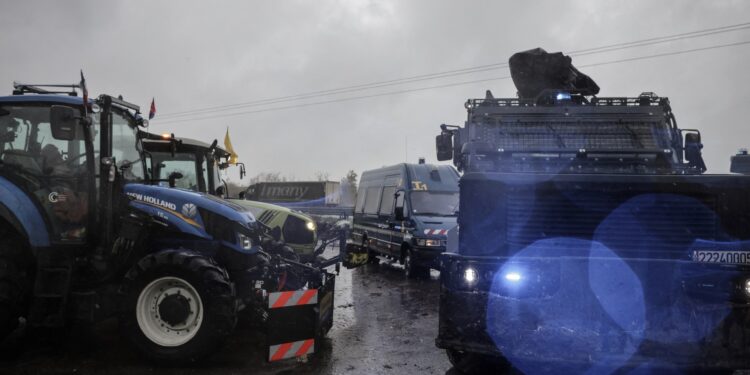On Thursday, a group of protesting farmers in France sought to stop operations at the port of Bordeaux in the southwest of the country, amid a new wave of anger rising in the agricultural sector in Europe’s largest crop-producing country.
Reuters quoted Jose Perez, a local representative from the Rural Coordination Union, as saying that farmers used their tractors to block all roads leading to the port that connects the city to the Atlantic Ocean via the Garonne River.
“We will remain here because we have not received any answers yet” from the government, he said.
Many farmers view the port, which also includes a grain dock, as a symbol of what they call unfair competition from foreign producers who are not subject to the same regulations.
Pressure from the European Union to complete long-term trade negotiations with countries in Latin America has reignited anger in France, where farmers are already disappointed by crop damage from rain, the outbreak of livestock diseases and early elections that have delayed the implementation of promises related to implementing support measures.
Continuing protests
French farmers protested the day before yesterday against trade talks between the European Union and the Mercosur economic bloc in South America.
The Rural Coordination Union closed government buildings in preparation for the threatened disruption of food supply chains.
Pressure for a trade agreement between the European Union and South American countries within the Mercosur bloc has led to renewed discontent in rural areas over unfair competition, burdensome regulations and falling farmers’ incomes.
After the largest agricultural union in France, the National Confederation of Farmer Unions in France, organized more than 80 protests last Monday, which included marches in front of government buildings and lighting “fires of anger” in fields throughout the night, the Union de Coordination Rurale entered the battlefield on Tuesday to denounce what it called “ The death of agriculture.
8.7 million people work in agriculture within the European Union, including 678,000 in France, 934,000 in Germany, and 774,000 in Spain.
Farmer protests in Europe are not new, and have been repeated several times. The agricultural sector on the Old Continent lived hot days last February when hundreds of tractors gathered in the Belgian capital, near the headquarters of the European Parliament, in protest against the leaders of the European Union.



